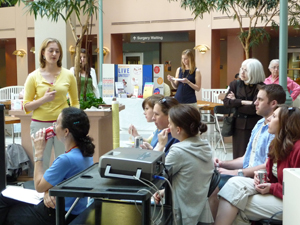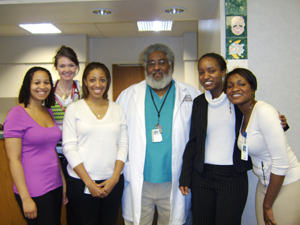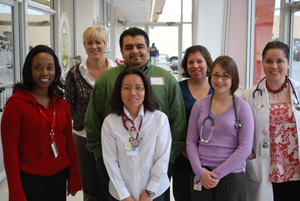 |
Standing, Ashley Huff, second-year medical student, shares her humanitarian aid experience on the U.S./Mexico border with students and staff. |
Huff — a second-year medical student — spent a summer working with several aid organizations along the U.S./Mexico border.
She recently shared about her humanitarian aid work at a Minority Health Awareness Month student involvement fair.
“It is not uncommon for humanitarian aid workers to find migrants whose feet have been worn down to the bone from wandering around lost for days in the Sonoran desert,” she said. “Due to the extreme conditions, if migrants get separated from their guide, they often become disoriented, suffer from heat exhaustion and eventually die of heat stroke without humanitarian intervention.”
Hundreds of people who risk it all for the hope of a better life in the United States perish each year while hiking to desert pick up points, Huff said.
|
|
Huff, an Elkhorn native, wants to return to Mexico to continue aid work. She and other students said their work with underserved patients has shapeed their career plans.
“There is such a huge disparity in health outcomes in our community and it’s important for people to recognize and address them,” said Christine Ngaruiya, a fourth-year medical student and one of the fair’s organizers. “As we worked to organize these events, we discovered many UNMC students with strong passions for working with underserved or minority populations.”
 |
Ira Combs, center, supervises students from the Colleges of Medicine, Nursing and Public Health at UNMC’s Baker Place clinic in north Omaha. |
 |
Tina Flores, M.D., supervises students from the Colleges of Nursing, Public Health and the School of Allied Health Professions at a south Omaha clinic. |
In addition to the student fair, another group of students organized community health fairs in both north and south Omaha. UNMC faculty, staff and students from the colleges of medicine, nursing and public health provided blood pressure, cholesterol and diabetes screenings as well as health information.
Nearly 75 adults and children were served in both locations.
UNMC students in the colleges of medicine and public health organized the events, which were co-sponsored by the Center for Reducing Health Disparities in the College of Public Health and the Office of Student Equity and Multicultural Affairs.
“Our desire is to provide a basic, yet extremely important, service to our community,” said Chantal Afuh, a fourth-year medical student and one of the event organizers. “Hypertension plagues our nation and especially impacts people of color. By making our community aware of the importance of preventing and controlling hypertension, we may be able to help them have better health outcomes.
“As students, it is important for us to form connections with our community to further enrich its citizens, as well as our educational process.”